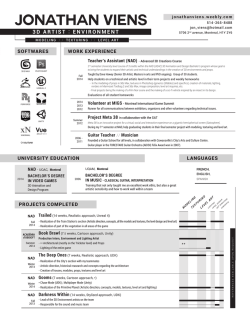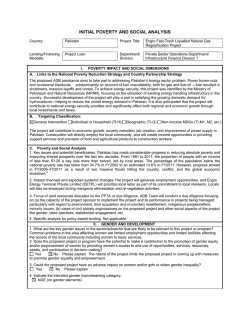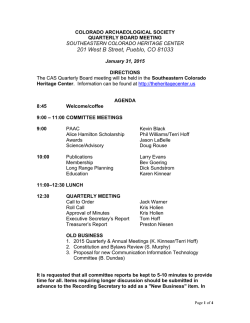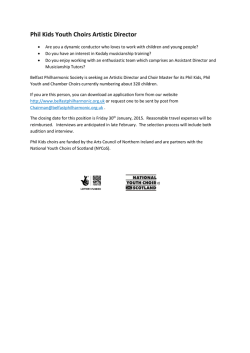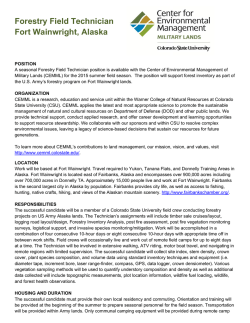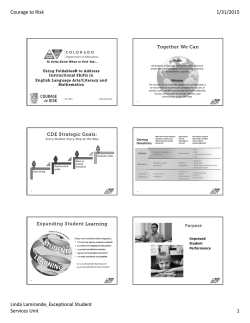
INTRODUCED - Colorado General Assembly
First Regular Session Seventieth General Assembly STATE OF COLORADO INTRODUCED HOUSE BILL 15-1161 LLS NO. 15-0628.01 Esther van Mourik x4215 HOUSE SPONSORSHIP Klingenschmitt, Neville P., Lundeen, Humphrey, Dore, Van Winkle, Landgraf, Buck, Everett, Rankin, Saine SENATE SPONSORSHIP (None), Crowder, Grantham House Committees Senate Committees State, Veterans, & Military Affairs A BILL FOR AN ACT 101 CONCERNING THE PROTECTION OF A PERSON'S FIRST AMENDMENT 102 RIGHTS IN THE ENFORCEMENT OF PUBLIC ACCOMMODATIONS 103 LAWS, AND, IN CONNECTION THEREWITH, PROTECTING A 104 PERSON'S RIGHT TO NOT BE INVOLUNTARILY COMPELLED IN 105 SPEECH, ACTS OF ARTISTIC EXPRESSION, OR ACTS OF RELIGIOUS 106 EXPRESSION. Bill Summary (Note: This summary applies to this bill as introduced and does not reflect any amendments that may be subsequently adopted. If this bill passes third reading in the house of introduction, a bill summary that applies to the reengrossed version of this bill will be available at http://www.leg.state.co.us/billsummaries.) The bill specifies that neither the civil rights division, the civil Shading denotes HOUSE amendment. Double underlining denotes SENATE amendment. Capital letters indicate new material to be added to existing statute. Dashes through the words indicate deletions from existing statute. rights commission, nor a court with jurisdiction to hear civil actions brought under the public accommodations laws may compel involuntary speech or acts of involuntary artistic expression or involuntary religious expression by a person when such speech or acts of artistic or religious expression would lead to that person directly or indirectly participating in, directly or indirectly supporting, or endorsing or impliedly endorsing an ideology, ceremony, creed, behavior, or practice with which the person does not agree. 1 Be it enacted by the General Assembly of the State of Colorado: 2 SECTION 1. Legislative declaration. (1) The general assembly 3 hereby finds and declares that the United States supreme court has ruled 4 on multiple occasions that governments may not compel involuntary 5 speech: 6 (a) In 1940, the court announced its 8-1 opinion in Minersville 7 School District v. Gobitis, 310 U.S. 586 (1940), upholding a Pennsylvania 8 school district's decision to expel three Jehovah's Witnesses who refused 9 to salute the flag. The court's decision was criticized by Eleanor 10 Roosevelt and over one hundred seventy newspaper editorialists. Then, 11 just a few years later in West Virginia v. Barnette, 319 U.S. 624 (1943), 12 the court reversed itself and ruled 6-3 that West Virginia's decision to 13 expel students who refused to salute the flag violated the first 14 amendment. Justice Jackson's opinion for the Court saw inconsistency in 15 an interpretation of the first amendment that "guards the individual's right 16 to speak his own mind, but left it open to public authorities to compel him 17 to utter what is not on his mind." 18 (b) In 1976, the United States supreme court considered another 19 compelled speech claim in Wooley, Chief of Police of Lebanon v. 20 Maynard, 430 U.S. 705. This case was brought by a New Hampshire 21 couple who had three times been prosecuted for covering up the motto -2- HB15-1161 1 "Live Free or Die" on their New Hampshire license plate. The Maynards 2 objected on religious grounds to the ideological message conveyed on the 3 state license plates. Writing for the court, Chief Justice Burger enjoined 4 enforcement against the Maynards of New Hampshire's law prohibiting 5 the obscuring or defacing of license plates because that invaded the 6 Maynards' first amendment rights. 7 (2) The general assembly further finds and declares that the 8 religious freedom section in the Colorado bill of rights, section 4 of 9 article II of the state constitution, specifies that "[n]o person shall be 10 required to attend or support any ministry or place of worship, religious 11 sect or denomination against his consent." 12 (3) Now, therefore, it is important that the state of Colorado 13 recognize and further implement the rights already granted to people of 14 diverse ideologies, to not be involuntarily compelled by the government 15 to speak or express art or religion against their consent. 16 17 SECTION 2. In Colorado Revised Statutes, 24-34-302, add (3) as follows: 18 24-34-302. Civil rights division - director - powers and duties. 19 (3) 20 RESPECT TO DISCRIMINATORY PRACTICES DESCRIBED IN PART 21 ARTICLE, THE DIVISION MAY NOT COMPEL INVOLUNTARY SPEECH, 22 INVOLUNTARY ACTS OF ARTISTIC EXPRESSION, OR INVOLUNTARY ACTS OF 23 RELIGIOUS EXPRESSION BY A PERSON WHEN SUCH SPEECH, ACTS OF 24 ARTISTIC EXPRESSION, OR ACTS OF RELIGIOUS EXPRESSION WOULD LEAD 25 TO THAT PERSON DIRECTLY OR INDIRECTLY PARTICIPATING IN, DIRECTLY 26 OR INDIRECTLY SUPPORTING, OR ENDORSING OR IMPLIEDLY ENDORSING AN 27 IDEOLOGY, CEREMONY, CREED, BEHAVIOR, OR PRACTICE WITH WHICH THE NOTWITHSTANDING THE DIVISION'S POWERS AND DUTIES WITH -3- 6 OF THIS HB15-1161 1 2 3 4 PERSON DOES NOT AGREE. SECTION 3. In Colorado Revised Statutes, 24-34-305, add (5) as follows: 24-34-305. Powers and duties of commission. 5 (5) NOTWITHSTANDING THE COMMISSION'S POWERS AND DUTIES WITH 6 RESPECT TO DISCRIMINATORY PRACTICES DESCRIBED IN PART 7 ARTICLE, THE COMMISSION MAY NOT COMPEL INVOLUNTARY SPEECH, 8 INVOLUNTARY ACTS OF ARTISTIC EXPRESSION, OR INVOLUNTARY ACTS OF 9 RELIGIOUS EXPRESSION BY A PERSON WHEN SUCH SPEECH, ACTS OF 10 ARTISTIC EXPRESSION, OR ACTS OF RELIGIOUS EXPRESSION WOULD LEAD 11 TO THAT PERSON DIRECTLY OR INDIRECTLY PARTICIPATING IN, DIRECTLY 12 OR INDIRECTLY SUPPORTING, OR ENDORSING OR IMPLIEDLY ENDORSING AN 13 IDEOLOGY, CEREMONY, CREED, BEHAVIOR, OR PRACTICE WITH WHICH THE 14 PERSON DOES NOT AGREE. 15 16 6 OF THIS SECTION 4. In Colorado Revised Statutes, 24-34-602, add (4) as follows: 17 24-34-602. Penalty and civil liability. (4) NOTWITHSTANDING 18 THE COURT'S POWER TO FIND A VIOLATION AND ORDER A FINE PURSUANT 19 TO THIS PART 20 INVOLUNTARY ACTS OF ARTISTIC EXPRESSION, OR INVOLUNTARY ACTS OF 21 RELIGIOUS EXPRESSION BY A PERSON WHEN SUCH SPEECH, ACTS OF 22 ARTISTIC EXPRESSION, OR ACTS OF RELIGIOUS EXPRESSION WOULD LEAD 23 TO THAT PERSON DIRECTLY OR INDIRECTLY PARTICIPATING IN, DIRECTLY 24 OR INDIRECTLY SUPPORTING, OR ENDORSING OR IMPLIEDLY ENDORSING AN 25 IDEOLOGY, CEREMONY, CREED, BEHAVIOR, OR PRACTICE WITH WHICH THE 26 PERSON DOES NOT AGREE. 27 6, THE SECTION 5. COURT MAY NOT COMPEL INVOLUNTARY SPEECH, Act subject to petition - effective date - -4- HB15-1161 1 applicability. (1) This act takes effect at 12:01 a.m. on the day following 2 the expiration of the ninety-day period after final adjournment of the 3 general assembly (August 5, 2015, if adjournment sine die is on May 6, 4 2015); except that, if a referendum petition is filed pursuant to section 1 5 (3) of article V of the state constitution against this act or an item, section, 6 or part of this act within such period, then the act, item, section, or part 7 will not take effect unless approved by the people at the general election 8 to be held in November 2016 and, in such case, will take effect on the 9 date of the official declaration of the vote thereon by the governor. 10 11 (2) This act applies to actions filed on or after the applicable effective date of this act. -5- HB15-1161
© Copyright 2026
